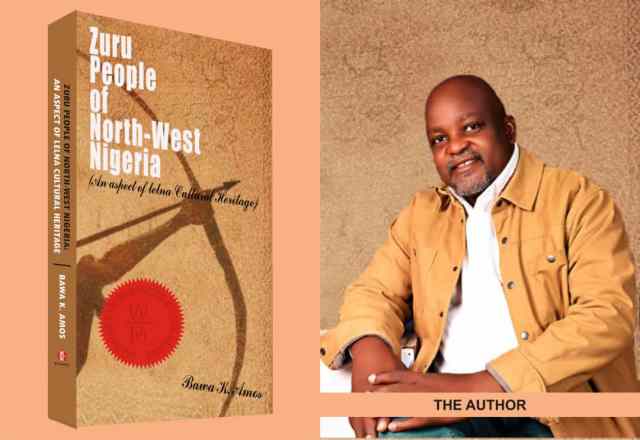MILESTONE TO AN ALELA HISTORIAN – AMOS BAWA By Haruna Penni
We cannot forget so soon the controversy generated by Pantami’s book on the clash between the ascendency of practical creation over theoretical knowledge. While the significance of both is well known, the different possessors of each of the divide had a field’s day marshalling out the pros and cons of each segment. However, while some professions have entry certification, others are clearly all comers field for the most vibrant practitioner just like in journalism which refused certification processing. It is the same thing with the Journalist as a writer and public relations practitioner.
I can easily recall the former SGF Late Waziri Jemaa Mohammed Aliyu’s caustic answer against the accusation by those more qualified against the less qualified, who they say as quacks should be stopped from doing their work even where they are not doing them. He would simply ask if the so called less qualified person was not doing the work well, and not simply on account of legalese and officialdom. And then plead that the matter be laid to rest unless there were other issues. This was a technocrat and bureaucrat who had seen various people at work in different organisations.It was the same philosophy adopted much later by the OSGF Permanent Secretary (General Services) Dr Aboki Zhawa who always drew the attention of every Extra-Ministerial Office under the Office of the SGF not to hesitate in carrying out any function of the SGF Office if they were capable of doing so. He showed no strong protection of departmental assignment of responsibility. What matters in the end, he believes, was that the vision and mission of the corporate organization is met.
As a result, the theoreticians in every field wishes the nose of the profession to be tighten to the exclusion of all other players. It is in this light that Amos Bawa, though both an engineer and accountant by professional training, has found the time, funding and interest to leave indelible marks on the sands of time by his incisive works on the history of Alela peoples. Bawa’s first worked as merchant navy officer with the dockyard of the Nigeria Ports Authority (NPA), Apapa, Lagos having studied marine engineering at the National Maritime Academy Oron. After his spell with the NPA, he enrolled for the Higher National Diploma in Accountancy programme of the Federal Polytechnic, Bida, Niger State. Bawa’s interest in writing Alela history like the others is to deconstruct the Euro and Hausa-centric history of Zuruland and its people published more than two decades after ‘’The History of Zuru People” commissioned by ZEDS but written by Hausa Fulani academics and several years after the pocket diaries of colonial spies posing as administrators and religionists. Amos books complement others published by Lelna authors such as Bulus Doroh Rikoto, Benjamin Dikki, HRH (Dr) Sani Sami (Sami Gomo 11), Michael M. Gujiya, Chief Naths Zome, Suleiman Magaji. However, there are unpublished ones used as reference materials by Dr Haruna Penni (wrote a 300 page novel and a 100 page play), Samuel Umaru Debte, Prof Samuel Ango Peni, Halima Dan-Fuller etcIt was from mere fascination with Zuru people that Bawa researched and wrote his magnus opus, Zuru People of North West Nigeria: An Aspects of Cultural Heritage published by Wadmaryamu & Sophiemas Consulting. The 2021 published book contains 368 pages and sold mostly online. It was popularly presented at the Nigeria Army Command Mess in Asokoro on June 18, 2022. This work is by no means his first and the last as he has other manuscripts in his kitty. As an ethnologist, he has travailed the breath and length of Nigeria and the A’lela kingdom. His works on Alela and Lelna are always welcome addition to the corpus of literature on sociology, anthropology, linguistics, archaeology, mythology/folklore, geography and the rest of the body of social and applied sciences.This means that apart from colonial records written by British military administrators posted from the imperial headquarters, very little extensive and in-depth work is produced and published by our academics versed in history, sociology, anthropology, archeology and cultural studies of the Zuru emirate peoples, outside publishing their academic thesis, dissertations, consultancy cum training projects and pieces of write ups in conference and journals to ensure their career progression. A field research visit by this writer to Argungu Emirate was chaperoned by the Emirate Historian who was also a history teacher at the Kebbi State of Education, Argungu. It was the same experience with Jarabawa Palace in Yauri where the historian took us to a ‘Journey of the Living Past’ in the museum. Thus in this vain, the position of the palace historian for Zuru Emirate should be created and filled if there is none. But it should be a job for whom the cap fits, not merely to lionise the mighty and kotow to heraldry.
Bawa has taken the gospel of Lelna history far beyond Nigeria as he sponsored himself to participate in various mass media national and international cultural talk-shops. He has spoken on different Lelna traditions and customs in-respect of the Golmo marital system, funeral, Clela language, Lelna calendar, archery, wrestling, inheritance, farming etc. He made several of these appearances in the Kaduna Capital Television in 2011, Channels Television Book Club in 2022, NTA International Guest Speaker on Culture, African Line in 2024 and the NTA International Guest Speaker on African Book Review in 2022.He also featured in numerous news and interviews of newspaper such as those of the Vanguard News 2015, Vanguard News 2022 and Blueprint News 2022. In all these outings, and during his public book presentations, he practically showcases some aspects of Lelna costumes, cuisine, hunting/war and farming implements and weapons of the Alela culture to the delight of the audience. This has enable him to be recognized as the de facto Alela historian hence his invitations to various cultural fora as guest speaker representing the Zuru Emirate. It was in one such event that it was decided that Alela should have a standard flag, standing cultural troupe, uniform and Zuru Restaurants like other ethnic groups.
The Zuru People of North West Nigeria is without argument the most comprehensive history book of the Alela peoples written by an indigene. It is a veritable aid-memorie and reference material for those with unquenchable thirst as researchers, historians, public affairs analysts, Zuru settlers, Diasporas and the first people alike. It is also an attempt like his forerunners to add his voice on the history of Zuruland and its people. In the course of penning the book, Bawa did not forget to acknowledge the invaluable contributions of Professor Samuel Ango, Esther Edisi, Dr Bawa Ahamed (Jolly), Dr Sebastine Gwimi Peter, Dr Sharu, Dr Samuel P. Umaru (Debte) the last who is a renowned Zuru history exponent that has been copiously cited by all Zuru historians. Bawa’s work contains the best and most up-to-date findings on the evolution and the making of the Lel’na nation in Nigeria. In this his seminal work, Bawa somehow adduced that the autochthonous Lel’na stock presently inhabiting the Zuru emirate in Kebbi State originated from the Lelna River in the Scandinavian countries traversing through Middle East, Libya, Egypt, Ethiopia, Sudan, South Africa, Katsina, Gusau, Gumi, Anka, Gwandu and Argungu Emirates. However, the Clela language belongs to the Kainji Banthoid family of Niger-Congo phylum, an extraction of the Bantus group of languages not even close to the Hausa Fulani Chadic group of the Afro-Asiatic family (Hamino Semitic race).
It must then be by the immutable law of natural selection over the millennia that it happens they are not blue-eyed, white-skinned, blond-haired and high pitched speakers like their neighbouring Caucasians. Nonetheless, there is ample evidence of this nexus according to Bawa’s glotto-chronological inquiries.This Bawa’s 2022 book The Zuru People….. is not the first in providing readers with refreshing historical angles and missing links. It will be recalled that in Zuru People and their Cultural Heritage published in 2017 Bawa traced and confirmed the Igbo movement out of Israel thus giving my friend Dr Law Mefor (now Anambra State Commissioner for Information who refused to believe Igbos are Israelites) the trail he was asking for to validate the Igbo’s migrating route from Israel through Sahara desert on their south-bound movement to the Bight of Biafra. Bawa alluded to the fact that the Igbos is another dialectical offshoot of Kambaris, and once congregated in Sudan province especially Nnewi and Orlu dialectical sub-groups. He noted the meaning of Kambari ‘come back here’ which has close interpretation to ‘let’s stay here’ in Igbo language and several other words similarity.The first word of his magnus opus was written by no other person than the former Chief of Army Staff, Lt Gen (Dr) Ishaya R. Bamaiyi who expressed pleasure and honour to write the foreword of the book. He noted that the work was timely as Lelna cultural heritage was dying due to careless involvement in and adoption of cultures of the settlers where the Lelna later became become enculturated.
The book has also enjoined other rave reviews, editorial hotspots and dynamic blurbs from eminent personalities from within and without the Ale’la. They comments emanated from: Alhaji (Dr) Sama’ila Yombe Dabai, mni. Deputy Governor of Kebbi state, Justice Danlami Zama Senchi, Sunday Moses Dabai, Samuel P. Umaru (Historian), Major General T. Daniel Anliani Chonoko, mni. (Rtd), Giwiimi Sebastian Peter, Gotname-Ibrahim Bitrus, Ojo Samson Adeniyi, and Ibrahim Hassan. Bawa has written quite a good number of books all of them revolving around Alela, Clela and its dialectical groups from across the state of Niger, which include: Zuru People and their Cultural Heritage 2017, Uhola Festival (Golmo Marriage Rite of Lelna People} 2024, The Dukkawa People, The Origin of Clela Language of the Lelna People 2022’, Ancient and Modern History of Peni 2022, The Origin of Clela Traditional Calendar 2024 and The Zuru People of the North Western Nigeria 2022.
His forthcoming books includes: The Zuru People: An Attempt at Authenticating the History of the Lelna People And The Origin Of C’lela As their Language, The Traditional Calendar of Lelna People of North Western Nigeria, The Etymology of the Word C’lela: A language Or Dialect Cluster, The Zuru People and Their Surrounding Neighbours, Senchi at a Glance, and The Dukkawa People.
Dr Haruna Penni is an author and the founder of the Association of Nigerian Authors in the FCT and was for several years the focal person on Abandoned Federal Capital Budget Project/Programmes in the FMBNP before his retirement. Apart from being an M&E specialist and chartered management consultant, he has served for two decades in The Presidency OSGF as a communications specialist starting as Information Officer for Zuru Local Government in 1981. He is a novelist, poet and playwright and currently the Director-General of the Institute of Authors, Nigeria which operates the IOA Writers Residency in Minna. He is on 08034299585 (harunapennii@gmail.com)

